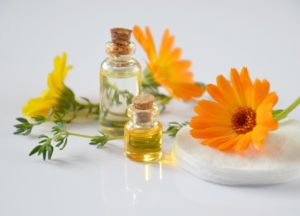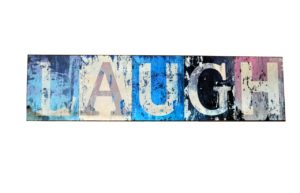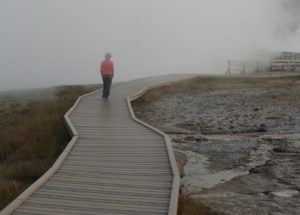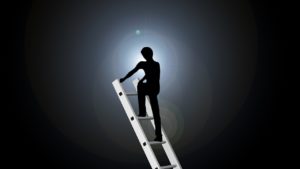
Crash Course
Always choose quality oils. This mainly ensures that impurities are removed and the risk of irritation is reduced. Always read the instructions and ALWAYS follow them. Some require dilution, some require carrier oils. Mix appropriately, FOLLOW THE DIRECTIONS.
Some Basic Science
The reason you can smell something is that some compound that makes up the thing you’re smelling is volatile. In chemistry, that means it’s easily evaporated into the air. Some part of that thing evaporates into the air and floats in your nose. It lands in your olfactory center in your nose. That is a special patch of tissue that has lots of “keyholes” for different shapes of molecules. That center sends the message to your brain and your brain translates it as a smell. There are a few families of molecules that contribute to the smells desired in essential oils. All of these families are labeled as “organic molecules”. Not in a chemical-free, USDA kind of organic, but in a chemistry way. It means they are built around chains of carbon atoms. Many of them are put together so they are volatile (evaporate-able) yet stable (don’t crumble to bits). Nature can build these chains as big as they want until they’re just so big they fall apart (unstable). Of course, the larger they get, the harder they are to get off the ground so to speak.
Molecule Classes
- Terpenes are why some bugs leave a smelly residue on your hand. And why tree resin and sap smell, and why some plants smell when you break their leaves or stems.
- Phenols are another group of volatile compounds that are detected by your sense of smell. Natural ones are kind of fun. They are found in chili peppers, oregano, thyme, cloves, and roasted coffee.
- Esters are volatile compounds that are produced by some fruits like apples, pears, bananas, and strawberries.
- Aldehydes are responsible for the smell of cinnamon, vanilla, and cilantro.
Many Uses
As aromatherapy, Essential Oils are mostly harmless. Honestly, I think the biggest harm is when they are promoted as “cures” or “treatments” of things. A little secret about our sense of smell: because it has such a strong direct connection to the emotional center of our brain, science has found that our sense of smell “memory” is stronger than any other stimulus. When you smell something familiar, the number of memories and stories your brain can connect is much larger than the memories recalled from sound or sight. And even though those volatile molecules that go in your nose send really strong signals to your brain, those oils do not soak into your body by just smelling it. Aromatherapy works probably because of the chemical cascade it triggers in the brain after you smell the scent. It might be just a basic brain chemistry cascade or a memory trigger that starts a more complex cascade. But I also think the power of suggestion is at play. Does the scent of cedar help you feel calm and cozy because of pure chemistry or is it because cedar is promoted for calming? Either way, you’re going to say “oh yeah, I feel calmer with cedar”. Some say it’s calming because it reminds them of being out in the woods. Is that a pure chemistry thing or a memory cascade thing? What if the smell of cedar reminds someone of the forest fire that burned down their house? No matter what pure chemistry or advertisements say, cedar will never be calming to them!
A Caution about Research Sources
While writing this piece, I read some articles about “essential oil chemistry”. There were claims about those compounds I listed above regarding cellular and DNA repair. There were no resource links to indicate where that information came from, and I could not find any other reputable sources to support those claims. It is still difficult to decide how much of these compounds actually circulate in your body, and if it’s enough to produce a noticeable change. One thing I do know for sure, any results someone gets in a lab, even if it’s repeatable and generally agreed as true, does not mean it works that way in the human body. So if compounds found in pine oil kill microorganisms in a petri dish, please do not assume that it is going to kill microorganisms in your house, much less your body. Your body is too complicated for there to be a “simple” answer to what ails it.
Another Bit of Science
A majority of the moisture in your skin is oil based. So when you put oils on your skin, the gaps that allow your natural oil out are more willing to allow and outside oil in. This is useful when science develops medicines that they want to soak into your skin. Whether the purpose is for it to just work locally, or whether the purpose is to avoid the destruction of a drug by your stomach acid or a filtration process of your liver known as “the first pass”. But it can also be dangerous because oils that easily gain access to your body can also carry dangerous things into your body. Hardware store solvents like paint thinner and WD40 can be dangerous and soak into your skin, and possibly take other chemicals with it.
Sorry to Scare You
Ok, enough of the scary stuff. But this science of the skin is how carrier oils work, they act as the doorway into your skin for the EO compounds as well as keep them there for a prolonged period of time. I know some instruct you to rub your EO mix on places where blood vessels are close to the surface (hands, wrists, face, feet) then it will get into your bloodstream. I’m not convinced that’s such a good thing, especially if you are not aware of the purity and quality of the oils you are using. But I’m also not clear on how much actually soaks far enough into your body to reach your bloodstream. I think a majority of the time, your body is just acting as your own personal diffuser. One thing’s for sure, I find EO’s more pleasant than lab-created perfumes.
Don’t Be Stupid
As for ingesting EO’s: DON’T BE STUPID! You may read things and they say “your body is built to protect itself….” but obviously things can get through that protection. Your skin is your body’s biggest defense, but as I mentioned, oils are really good at getting through that. They may also say “if they’re made it nature, they should be safe to eat…”. You don’t eat poison ivy, do you?? Even Bear Grylls taught us that some plants are not friendly to our bodies, on the outside or the inside. So why would we believe that everything that produces oils would be safe? A pharmaceutical medication called Digoxin was originally developed from the foxglove plant. Please don’t ingest foxglove – digitalis poisoning is a real thing and can cause symptoms as severe as life-threatening arrhythmias.
My Essential Oils Rule
If I had to come up with my own rule, it would be this: if you would normally eat the thing the oil is made from, then it MIGHT be okay. You don’t eat pine bark, do you? See, to me, that’s silly. On the other hand, lemon oil? Okay. Orange or grapefruit? okay. Peppermint and cinnamon? Eh, maybe when they’re diluted enough (like in candy!). My thought on this: If you want more spice in your life, add more spices to your life. Salt and pepper are boring! Season your food with herbs and spices, freshly picked or ground ones are preferable. You can have more benefits than you’d care to count including the natural oils from those natural products.
Certified Certification
The other problem is that anyone can go on the internet and join or create a program, and come out the other side with a “certification”. On every Essential Oil site, brochure, and label, companies should be using a statement that reads something like this:
*These statements have not been evaluated by the Food and Drug Administration. This product is not intended to diagnose, treat, cure or prevent disease.*
That means “no one is watching us, and as long as we don’t use certain keywords, we can say whatever we want, and no one will check up on us, ask for our recipes, or try to prove us wrong”. So words like “therapeutic grade” are just bogus fluffy words they want to use to convince you they’re “better” or “safer”. As much as I don’t like overbearing government regulations, and I know lobbyists have deep pockets in some branches, there are groups that grade foods as well as chemicals to determine their purity and quality before they are allowed to be put in products that humans will eat. The USDA puts grades on many agricultural products to determine what’s safe for humans to eat. The FCC judges lab-produced chemical. And I know many of the items on the FCC’s list (including food preservatives and coloring agents) are under scrutiny based on “pure and high quality, but really safe?”. But I have not found this level of transparency in EO manufacturers, thus they will not be going in my mouth.
Logical Fallacy
The last thing I’m going to mention is the logical fallacy of Appeal to Ancient Wisdom. This is the misconception that the oldest treatments for ailments are the best because they are the oldest. If you want to hear about some of the stupid and horrific things ancient (and not so ancient) people did in the name of trying to treat and heal people, listen to the podcast,
Sawbones, they go over it a lot.Now, I’m not trying to negate what ancient cultures have contributed to the increased understanding of the human body and compounds found in nature. Science has actually proven the benefit of some ancient but now modernized treatments. But that doesn’t mean the “truth” of all ancient medicine is now proven true. This is a classic case of “when you know better, do better.” Modern science has allowed us to gain
Science Has Done Us Good
Now, I’m not trying to negate what ancient cultures have contributed to the increased understanding of the human body and compounds found in nature. Science has actually proven the benefit of some ancient but now modernized treatments, but that doesn’t mean the “truth” of all ancient medicine is now proven true. This is a classic case of “when you know better, do better”. Modern science has allowed us to gain an understanding of how diseases are caused rather than blaming it on “Evil”. Microscopy has allowed us to see things that are way too small for our eyes to see, including things that make us sick and things that our bodies are made of. The scientific method gave us a process to be able to test and retest theories and processes, and accept them as true rather than a “one and done” type of experiment. Evidence-based medicine allows the modern world to make objective decisions about treatment and healing, so someone’s personal feelings about you or spiritual beliefs about the cause of the illness do not affect the quality of your care. I say all of this to say EO’s may have their place in your health plan, but please don’t assume that they are superior because they are “natural” or because they are “ancient”.
The Bottom Line
It’s ok to diffuse them in your house: they smell good. It’s ok to put them in your body lotion or massage oil or face moisturizer: they smell good. I’d prefer you not swallow them. But if you’re going to swallow them, you BETTER be talking to a physician or practitioner who knows a thing or two about the human physiology and biochemistry and has real and solid credentials. And for heaven sake’s don’t take advice from Dr. Google!







